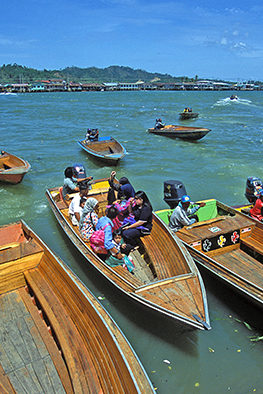Published on June 8, 2018
Article 89
6 Tips to Help Scam-Proof your Southeast Asia Trip
Warning sign about fake monk in Thailand. Image courtesy of Allan Wilson.
Where travelers go, so must scammers, too – plenty of traps await travelers who trust too much when traveling in Southeast Asia. Fortunately, getting scammed is no longer a given for travelers: if you’re wise to their tricks, like the bloggers below, you can skate by without losing a cent to dishonest dealers! Read on and find out how to beat the scammers at their own game:
The Old “You Damaged my Scooter” Trick
The setup: When renting a scooter in Indonesia (or anywhere in Southeast Asia) it pays to be pedantic!
A common scam is for the person hiring the vehicle to claim that you’ve damaged it while it was under your care, when in fact there was already damage. They will then demand extortionate extra payment or keep your deposit. This once happened to a friend, and he had no choice but to pay up as they had his passport as his deposit.
How to deal: To avoid this, make sure you take lots of detailed pictures of the state of the bike before you set off – in full view of the scooter’s owners – and if you can, get them to acknowledge any pre-existing damage in writing.
And never, ever leave your passport as a deposit – as you will then have no choice but to pay to get it back if they decide to be dishonest. Often it can be safer to rent through your accommodation as they don’t have a motive to rip you off.
– Ellie Hattersley, Grad Gone Global (Instagram|Twitter|Pinterest)
The Old “Temple is Closed” Trick
The setup: The infamous “Temple is closed” scam is used all across Asia, and in particular in Bangkok at the famous tourist temples as well as at the Grand Palace.
When you’re getting close to one of the famous attractions, some locals will approach you and tell you that the building is actually closed today (i.e. because of an event or a ceremony). Afterwards, they will offer you to take you around to some of the other temples and attractions of the city – and for sure, they will stop at some tour agencies and some jewel stores urging you to buy something.
A famous variation of the scam is “Your hotel/hostel is closed due to a fire/flooding/… BUT I know another great place…” after your arrival at the airport or at the train or bus station.
How to deal: To avoid this scam, don’t instantly believe someone who’s approaching you telling you that a building would be closed – in 99% of the cases it’s not true.
Go there by yourself and have a look, or ask at the reception of your hotel / hostel before you got out exploring if there are any special events happening anywhere which might cause a building to actually be closed.
The best prevention for this scam is just being aware of it, and when someone approaches you in front to the Grand Palace in Bangkok telling you the story, just laugh and keep walking!
– Patrick Muntzinger, German Backpacker (Facebook|Twitter|Instagram)
Border crossing between Cambodia and Thailand. Image courtesy of Matt Hulland.
The Old “Pay $35 for a Visa Or Else” Trick
The setup: One of the trickiest scams I had to navigate when in Southeast Asia was while crossing the Thailand to Cambodia border in Poipet. I crossed it as part of a bus journey from Bangkok to Siem Reap Cambodia, which was great value.
The scam started when we got close to the border, we stopped at a restaurant and while waiting we were given forms to fill in with the opportunity to buy a visa for $35. I knew this was too much and declined.
We were then told if we didn’t pay, we would not be allowed in to Cambodia and be stuck at the border. The scam went from “Let us help you” to using fear tactics. After a few final threats of abandonment, our group was back on the bus, heading to the border. Or so we thought. There was one final twist to this scam when we were taken to an official-looking building where a uniformed man asked for $30 this time. Once again, we refused. We finally made it to the border where we were stamped out of Thailand and when we made it to the Cambodian side, there was no issue not having pre-bought the visa.
How to deal: I have heard stories that what they are selling are not legitimate visas so you will have to pay again anyway, although I can’t confirm that is the case. Basically, the key thing to remember is to be very careful when buying visas from a 3rd party, either make sure you pay after you are stamped out of the previous country or at an official consulate.
– Matt Hulland, the Travel Blogs (Facebook|Twitter|Instagram).
The Old “Fake Monk” Trick
The setup: You can tell a real monk from a fake monk very easily. The routine of a Buddhist monk is very strict in Southeast Asia, where they start each morning as early as 03:30AM for morning prayers, before the daily alms collection between roughly 05:00AM and 06:00AM. At this time they will collect donations of food and requisites, which is often no more than rice and some snacks, from layfolk in the nearby streets. And tourists are very welcome to do the same.
However I sometimes hear the monk’s “alms bowls” referred to as “begging bowls” which is untrue. As monks do not approach people to ask for food, and merely just accept donations offered to the temple.
How to deal: if approached by a monk in public, or are asked for money, then this will almost certainly be a fake or rogue monk. As it is very simple for schemers to just wear the signature saffron robes, and visitors are just unaware of the traditional routines of monks.
As monks will otherwise rarely be seen outside of temple grounds, unless travelling for local Buddhist ceremonies, or maybe on a pilgrimage between temples. So it is best to be wary of any monks found outside of temple grounds.
– Allan Wilson, Live Less Ordinary (Facebook|Twitter|Instagram)
Monkeys in Bali, Indonesia. Image courtesy of Gary Low.
The Old “Trained Monkey Thieves” Trick
The setup: Perched atop an impossibly picturesque cliff with waves crashing below, the Uluwatu Temple was a highlight of my trip to Bali. Before entering the compound though, my guide encouraged me to stow away all loose items and leave my backpack in the car.
The temple compound is also home to hundreds of monkeys, which are sacred animals in Hindu tradition. Alas, a population of these monkeys have been trained to snatch items off visitors and run off, leaving a trail of chaos and helplessness in their wake… until a ‘friendly’ local helps get them back by coaxing the offending monkey with food. Undoubtedly, the grateful tourist will need to pay up for the recovery efforts.
How to deal: If you’re visiting the Uluwatu Temple, remember to keep your sunglasses, water bottles, dangling earrings, neck chains in your hotel or your car. To be extra safe, loop your camera strap around your arm or hang it around your neck. You can never be too sure with these intelligent and nimble monkeys just lurking past the next tree!
– Gary Low, 2-Week Trips (Twitter|Instagram)
The Old “Taxis + Travelers = Scams Galore” Trick
The setup: There are several attractions that draw tourists to the Philippines. While taking a vacation should be relaxing, it is very important to be mindful and vigilant of swindlers that can ruin the experience.
The Philippines has a rampant problem with transportation scammers and it starts as soon as you land in the airport. I can attest to that as I’ve experienced it myself numerous times.
Common trickeries include shutting off the taxi meter, a fixed rate endorsed by the airport authorities, driving you around in circles, a secret pedal that manipulates the meter rates, and so on. There was even one time that we had a tricycle driver exclaim to other drivers in the local language, “Nice, foreigners! I hit the jackpot here. I’d be able to charge them the foreigner fee!” Little did he know that we spoke the language.
How to deal: I’ve learned that the best way to outdo these scammers is to be knowledgeable of your trip and local culture. I also recommend using services such as Grab or Uber, who vet their drivers’ background.
– Yamy Hartsough, GoFamGo (Facebook|Youtube|Instagram)






